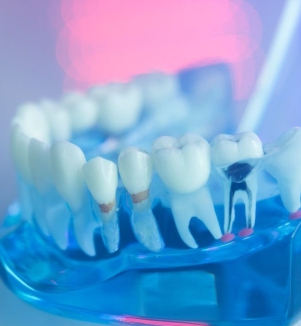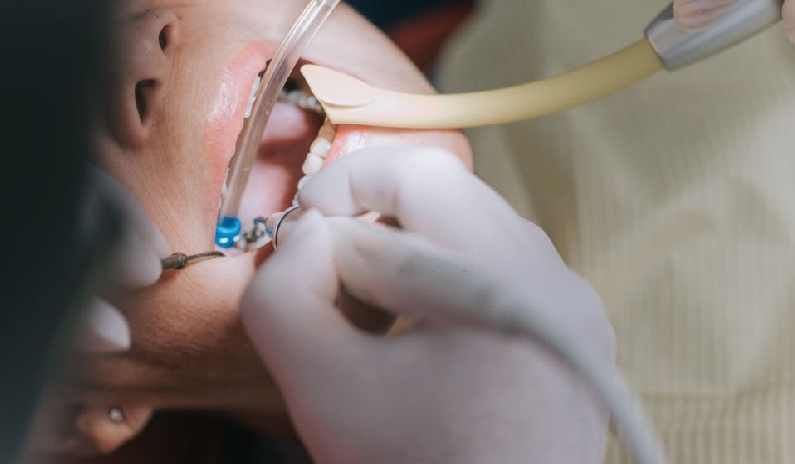Myths persist about root canals being grueling procedures. The reality is that root canals, also know as root canal therapy often take no longer than getting a dental filling. Thanks to innovations in technology, root canals are painless and more successful than ever at preventing tooth loss, or the need for tooth extraction. Read on for everything you need to know about root canals.
Why Do I Need a Root Canal?
If your dentist informs you that you need a root canal, it is because your tooth has suffered severe decay. The decay is substantial enough that a traditional dental filling will not be sufficient to save the tooth. You may also need a root canal if your tooth has developed an infection within the pulp (interior chamber).
A root canal is a final effort to preserve a tooth. Without a root canal, your tooth will need to be extracted, and replaced with a dental restoration such as a dental implant or a dental bridge. However, before the tooth is extracted, you may suffer severe, ongoing pain if you let a severely decayed tooth go untreated.
Leaving an infected tooth untreated can cause even more serious risks to not only your oral health, but to your overall health as well. Infected teeth that are not treated often lead to the development of a dental abscess. A dental abscess is caused by a bacterial infection, that causes a pus-filled sac to form near the infected tooth. The pain from the abscess may radiate up your cheeks, into your ears, or down your neck.
The infection may also spread, requiring powerful antibiotics and emergency dental treatment. In other cases, the infection can lead to the development of periodontal disease, which leads to deterioration of the jawbone.
To put it simply: if your dentist recommends a root canal, it is in your best interest to book the procedure as soon as possible.
What are the Signs or Symptoms that I need a Root Canal?
Sharp tooth pain is the leading symptom of infection in the tooth. However, tooth pain is also a symptom of tooth decay, gum disease, or the arrival of wisdom teeth. Therefore, the only conclusive way to know that you need a root canal is by receiving an accurate diagnosis from your dentist.
Other signs and symptoms that you may have a severely decayed or damaged tooth requiring a root canal include:
- New development of tooth sensitivity
- Sharp shooting pain when you speak
- Swollen gums
- Bleeding gums
- Loss of appetite
- Tooth has become discolored
- Tooth has developed a crack
- Tooth feels loose
If you experience any of these signs of decay or infection in your tooth, time is of the essence. Book an appointment with your dentist immediately.
Root Canal: Step-By-Step Guide to the Procedure
When you arrive for your appointment for root canal therapy, here’s what you can expect.
You will first have digital dental x-rays taken, so that your dentist has the most updated, high-resolution images of the location of decay or infection in your tooth.
The area of the mouth surrounding the affected tooth will be completely anesthetized. Nervous patients may inquire about sedation options such as laughing gas (nitrous oxide).
Once the area is completely numb, your dentist will drill a tiny hole in the crown (visible part of the tooth). This tiny hole gives your dentist access to the pulp of the tooth. The pulp and all decay will be removed (pulpectomy). Then, the pulp chamber and the canals will be thoroughly disinfected and cleaned. In some cases, your dentist may need to reshape the canals as well.
Then a safe, biocompatible material will be used to fill the canals and the pulp chamber. The tooth will be covered with a temporary dental crown. Within a couple of weeks, you’ll return to the dentist to have your permanent crown bonded to the tooth.
Is a Root Canal Better Than Having the Tooth Pulled?
Wherever possible, you should opt to preserve your natural teeth. Your tooth roots play a vital role in maintaining the strength of your jawbone. When you are missing teeth, the jawbone begins to deteriorate. Over time, this can create a sunken look around your mouth, negatively impacting your facial structure.
In restoring natural teeth to excellent health with a root canal and dental crown, you’re also helping to reduce the risk of future tooth loss. Studies have shown that once you lose one tooth, you’re much more likely to lose additional teeth. In addition, by preserving and restoring your natural tooth, you help to stabilize the adjacent teeth, preventing them from shifting into the gap left by a tooth that has been extracted.

Finally, remember that a root canal is far more cost-effective than having a tooth extracted. This is because you’ll need to eventually replace the missing tooth with another type of dental restoration. Dental bridges are effective for filling gaps in your smile, but they do not help to preserve your jawbone. Dental bridges will also need to be replaced every 7-10 years. Dental implants are the best solution to missing teeth, but dental implants are more expensive than a root canal.
If you have a tooth extracted and choose not to replace it, the empty socket puts you at increased risk of developing gum disease, as the socket will tend to accumulate bacteria.
Do Teeth That Have Root Canals Require Special Care?
Once you’ve had a root canal, you can move on with your life without the need for special tools, or cleaning instruments. To care for a tooth that has been treated with a root canal, you need to brush twice daily for a full two minutes. You also need to floss or use a water flosser to remove debris from the gumline and between the teeth. You should follow up with your dentist for regular cleanings and oral exams every six months.
Schedule a Dental Appointment for Tooth or Mouth Pain in La Puente
If you develop any pain or swelling in your mouth, it is important to see an experienced dentist right away. Dr. Kumar has provided premium dental care in La Puente for three decades. As a top-reviewed dentist in La Puente, Dr. Kumar provides complete general, cosmetic, and restorative dental treatments in the San Gabriel Valley, just miles from Los Angeles. Request an appointment online or call 626-968-3793 to schedule your appointment at La Puente Family Dental Center.

